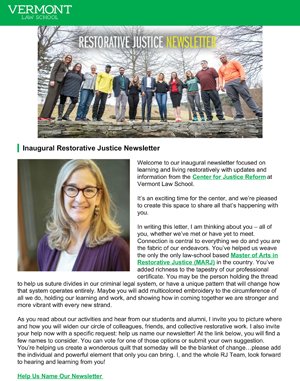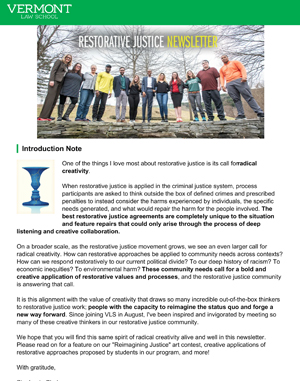For a few, like Molly Gray JD’14, the connection to the Green Mountains is deeper and more intense than trails or fishing holes. She was born in her parents’ 200-year-old farmhouse in South Newbury, about 40 miles from South Royalton. She grew up helping pick vegetables and selling produce at their farmstand, rubbing Vermont soil under her fingernails. She spent the winters tramping around the woods on cross-country skis. She followed in the tracks of her father, a former Olympic cross-country skier, when she took up the sport competitively. eventually she raced for the University of Vermont, one of the country’s elite collegiate programs.
After college, an interest in politics and international affairs led Gray to Washington, DC, where she wound up working as a congressional liaison for the International Committee of the red Cross. She considered studying law in DC. Lawyers there advised her that going to Vermont to study international law would be career suicide. But Vermont kept calling to her. “Just the landscape and the connection to the land and the outdoors. I just felt like something was missing the whole time I was in DC, and Vermont was home. This was home,” says Gray. As she prepares to graduate, she says the law school—far from being a death knell—has given her surprising opportunities in international law. (She co-hosted a conference on international law in the aftermath of 9/11, and she interned with a Harvard scholar on a case study regarding Somalia’s 2011 famine.) She has no regret about choosing to return to her home state.
The place is so ingrained in Gray that words are hard to find that adequately describe the landscape and her connection with it. She talks of the intensity of the seasons, the freshness of the air, and being able to see stars at night. Of hearing crickets and frogs, and being outside all the time. But still, she can't quite name it.
Perhaps the late Supreme Court Justice William O. Douglas articulated—for Gray and so many others—the closing argument. He was a judge known for his love of nature, both in his rulings and his personal writings. He grew up rambling through the mountains near his boyhood home of Yakima, Washington, and continued his outdoor adventures even while on the bench. In the 1960 book My Wilderness, he told of a trip to a remote beach on the tip of Washington’s Olympic Peninsula. That beach was far from Kent’s Ledge or McIntosh Pond or ski trails that wind through groves of Vermont sugar maples. But his description of it struck a chord that echoes the sentiments of the advocates and lawyers and law students who spend time in all those wild places.
“(T)o be whole and harmonious, man must also know the music of the beaches and the woods,” he wrote. “He must find the thing of which he is only an infinitesimal part and nurture it and love it, if he is to live.”


















